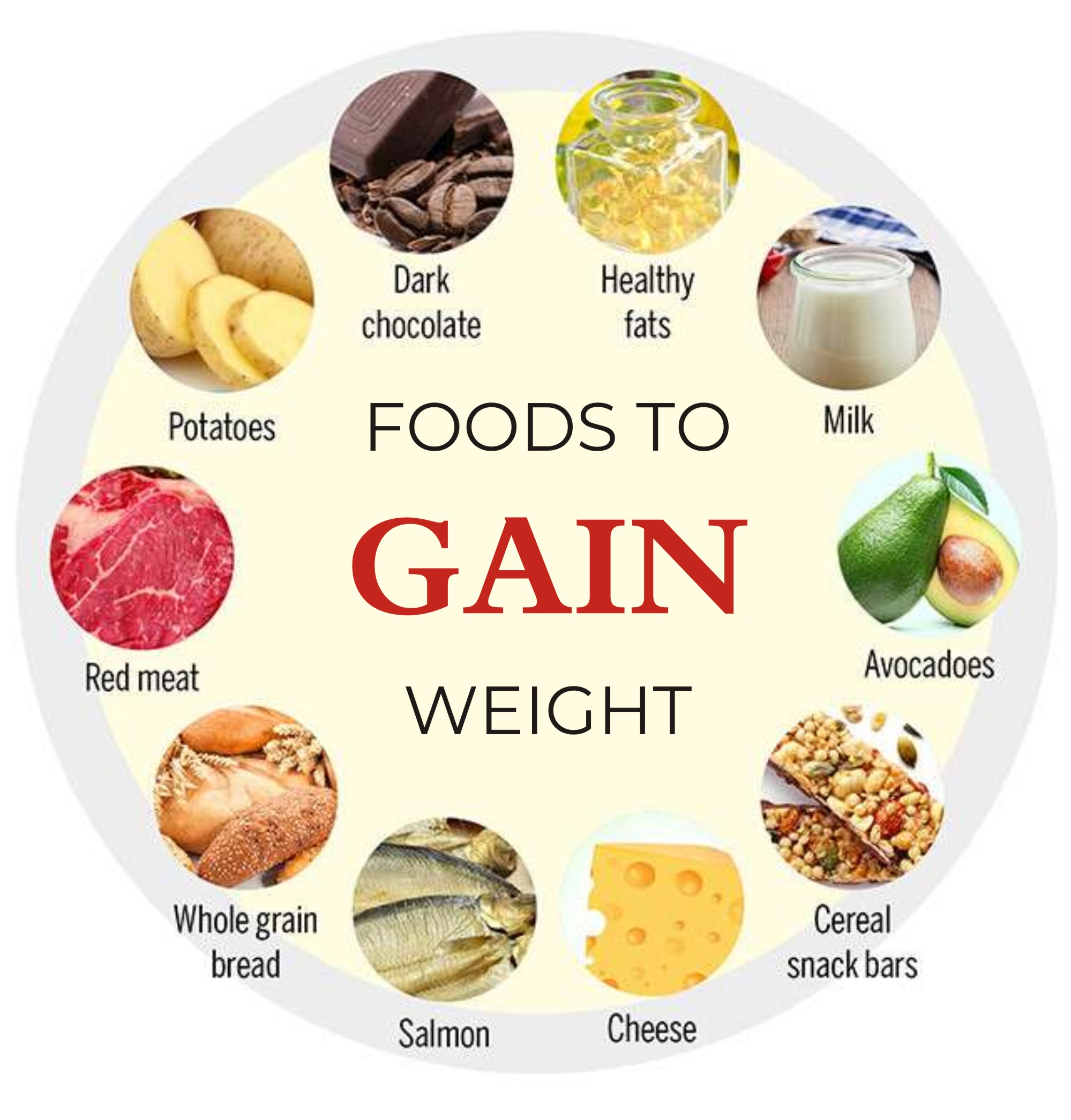If you’re looking to add a few pounds to your frame, turn your focus to the kitchen. In this article, we’ll explore a variety of healthy meals that can help you achieve your weight gain goals. From protein-packed breakfast options to hearty lunch ideas and satisfying dinners, these meal ideas will not only nourish your body but also support your journey towards a healthier weight. So grab a fork and get ready to savor some delicious meals that will help you reach your desired weight.
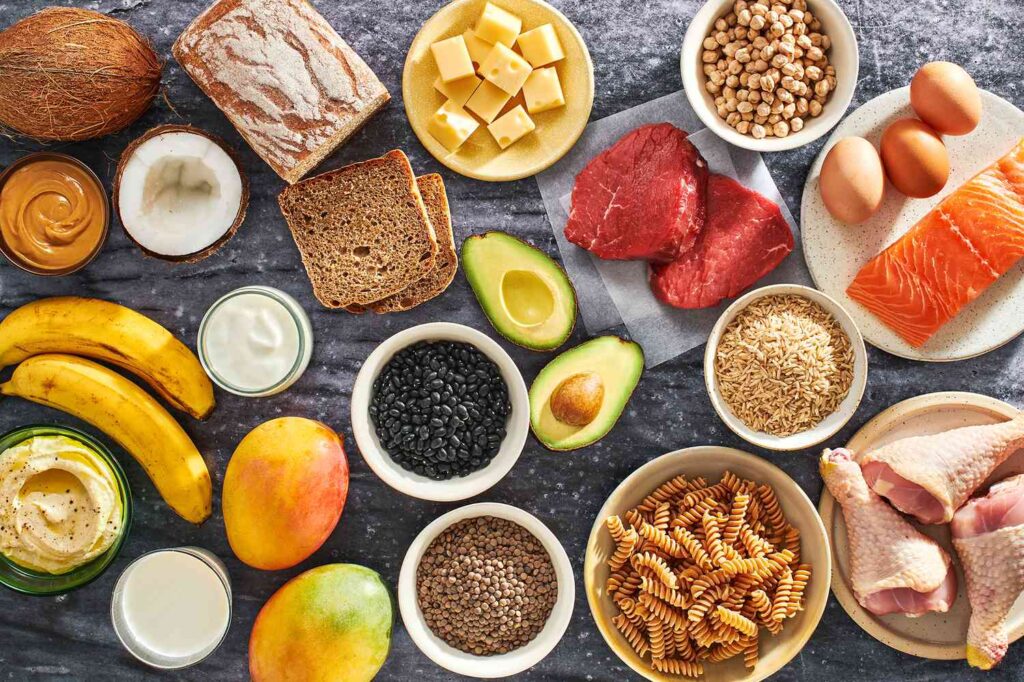
Importance of Healthy Meals for Weight Gain
Gaining weight in a healthy and sustainable way is just as important as losing weight. While many people aim to shed those extra pounds, there are individuals who struggle to put on weight for various reasons. Whether you’re looking to build muscle, recover from an illness, or simply want to feel more confident in your own skin, incorporating healthy meals into your diet can help you achieve your weight gain goals.
Balanced Diet to Promote Weight Gain
A balanced diet comprising of all the essential nutrients is crucial when it comes to gaining weight. Rather than relying solely on calorie-dense and unhealthy foods, it is important to focus on nourishing your body with a variety of nutrient-rich foods. This will help ensure that you gain weight in a way that supports overall health and well-being.
Nutrient-Dense Foods to Include in Meals
When aiming to gain weight, it is important to focus on nutrient-dense foods that provide a good balance of macronutrients and micronutrients. These foods not only support weight gain but also provide your body with the necessary vitamins, minerals, and antioxidants to function optimally. Let’s explore some nutrient-dense foods that can help you achieve your weight gain goals.
Protein-Rich Foods for Weight Gain
Protein is an essential macronutrient that plays a critical role in muscle growth and repair. Including protein-rich foods in your meals is key to gaining healthy weight. Here are some excellent sources of protein that you can incorporate into your diet:
Lean meats
Lean meats such as chicken breast, lean cuts of beef, and turkey are excellent sources of high-quality protein. They not only provide the building blocks for muscle growth but also contribute to overall weight gain.
Poultry
Poultry, such as chicken and turkey, is another great source of lean protein. It is low in fat and can be easily incorporated into various meals, making it a versatile option for weight gain.
Fish and seafood
Fish and seafood, such as salmon, tuna, and shrimp, are not only high in protein but also rich in healthy fats like omega-3 fatty acids. These fats are important for overall health and can contribute to healthy weight gain.
Eggs
Eggs are a convenient and affordable source of high-quality protein. They also contain essential vitamins and minerals that support overall health. Whether you prefer them scrambled, boiled, or in an omelette, incorporating eggs into your meals can help boost your calorie intake.
Plant-based proteins
For those following a vegetarian or vegan diet, plant-based proteins such as tofu, tempeh, beans, lentils, and chickpeas can provide the necessary protein to support weight gain. These foods are also rich in fiber, which aids digestion and promotes satiety.
Carbohydrate-Rich Foods for Weight Gain
Carbohydrates are the body’s primary source of energy. Including an ample amount of carbohydrates in your meals can help support weight gain. However, it is important to choose complex carbohydrates that provide sustained energy and fiber. Here are some carbohydrate-rich foods to consider:
Whole grains
Whole grains like oats, brown rice, quinoa, and whole wheat bread are excellent sources of complex carbohydrates. They are packed with fiber, vitamins, and minerals, providing a steady release of energy.
Starchy vegetables
Starchy vegetables like potatoes, sweet potatoes, and winter squash are not only rich in carbohydrates but also provide essential vitamins and minerals. They can be easily included in meals and snacks.
Legumes
Legumes, including beans, lentils, and chickpeas, are not only high in carbohydrates but also provide a good amount of protein. They are versatile ingredients that can be incorporated into soups, stews, salads, and side dishes.
Fruits
Fruits contain a natural sugar called fructose, which provides a quick source of energy. Including a variety of fruits in your diet can help increase your calorie intake while providing essential vitamins and minerals.
Healthy Fats for Weight Gain
Including healthy fats in your diet is crucial for gaining weight in a healthy manner. Healthy fats not only provide a concentrated source of calories but also support hormone production, protect organs, and promote overall well-being. Here are some healthy fats to incorporate into your meals:
Avocados
Avocados are not only delicious but also packed with healthy fats. They also provide essential nutrients like fiber, potassium, and vitamins. Adding avocado slices to sandwiches, salads, or even making guacamole can increase your calorie intake.
Nuts and nut butter
Nuts, such as almonds, walnuts, and cashews, are rich in healthy fats and make for a convenient snack. Nut butters, such as almond butter and peanut butter, can be spread on toast, added to smoothies, or used as a dip for fruits and vegetables.
Seeds
Seeds, including chia seeds, flaxseeds, and pumpkin seeds, are a great source of healthy fats. They can be sprinkled on top of yogurt, added to smoothies, or incorporated into baked goods to increase your calorie intake.
Oils
Healthy oils like olive oil, coconut oil, and avocado oil can be used for cooking, dressing salads, or drizzling over roasted vegetables. They provide a concentrated source of healthy fats and can easily increase the calorie content of your meals.
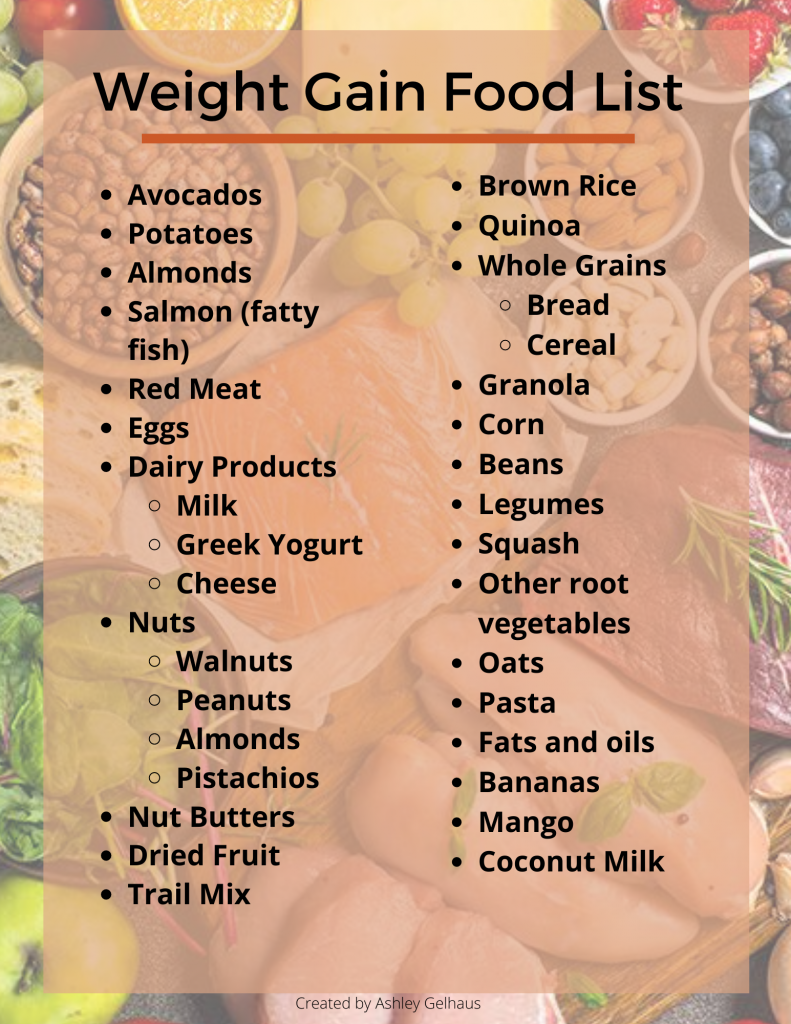
Calorie-Dense Snacks for Weight Gain
In addition to including nutrient-dense foods in your meals, incorporating calorie-dense snacks can help increase your overall calorie intake. Here are some snack ideas that are rich in calories and nutrients:
Trail mix
Trail mix consisting of nuts, dried fruits, and seeds is a portable and convenient snack that provides a good amount of calories. It can be enjoyed on its own or added to yogurt or smoothies for an extra boost.
Granola bars
Granola bars made with oats, nuts, and dried fruits can provide a quick and easy source of calories. Look for bars that are low in added sugars and high in fiber for maximum nutritional value.
Energy bites
Energy bites made with ingredients like oats, nut butter, nuts, and dried fruits are a nutritious and calorie-dense snack. They can be made in advance and stored in the refrigerator for a quick grab-and-go option.
Cheese and crackers
Pairing cheese with whole grain crackers is not only delicious but also provides a good amount of calories. Choose a variety of cheeses to add flavor and incorporate different nutrients into your snack.
Liquids to Boost Caloric Intake
In addition to solid foods, including calorie-dense liquids in your diet can help increase your overall calorie intake. Here are some liquid options to consider:
Smoothies
Smoothies can be packed with fruits, vegetables, protein powder, and healthy fats like nut butter or avocado. They provide a quick and convenient way to increase your calorie intake while incorporating various nutrients.
Protein shakes
Protein shakes made with protein powder, milk or a milk alternative, and other ingredients like fruit or nut butter can provide a concentrated source of calories and protein. They can be enjoyed as a snack or alongside a meal.
Milkshakes
Milkshakes made with whole milk or a milk alternative, ice cream, and flavorings like chocolate or fruits are a calorie-dense beverage option. They can be enjoyed as a treat or as a part of a meal to increase calorie intake.
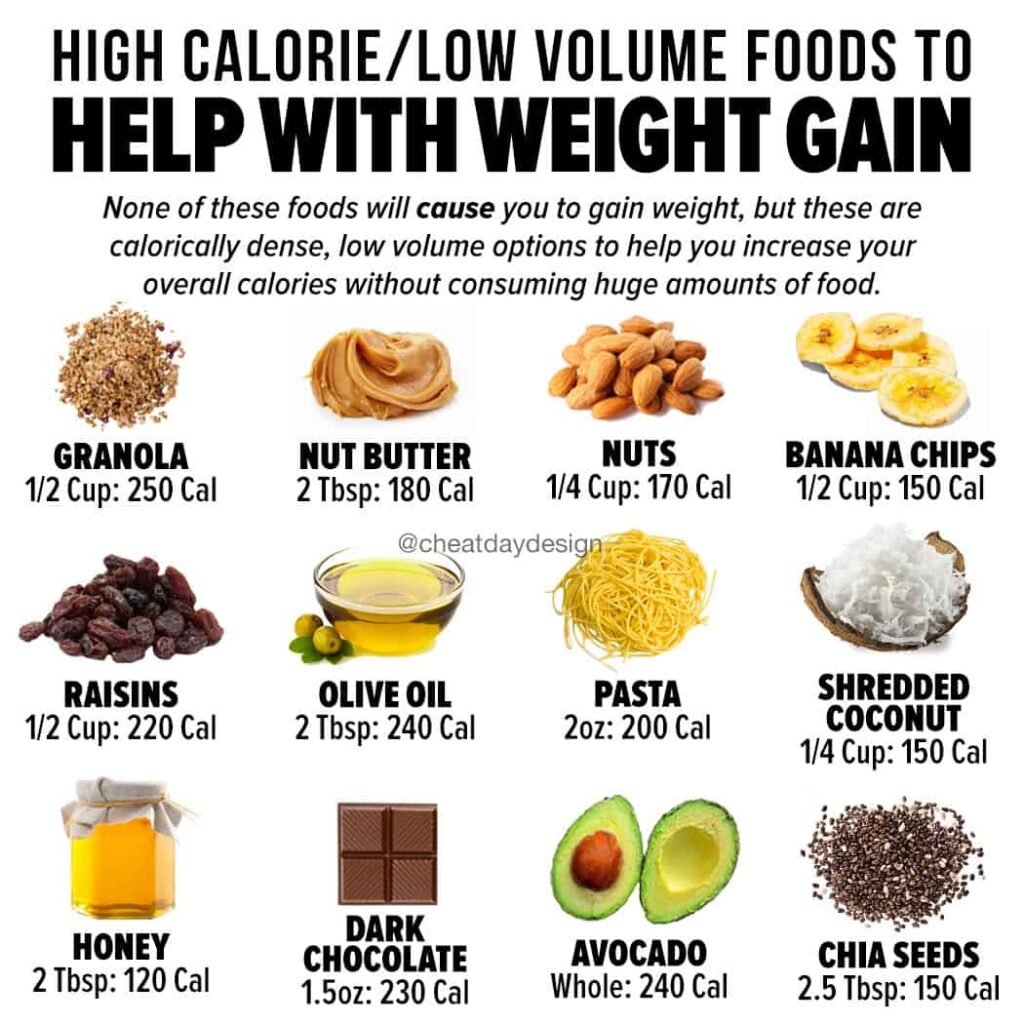
Meal Planning Tips for Weight Gain
Meal planning plays a crucial role in gaining weight in a healthy and efficient manner. Here are some tips to help you create a meal plan that supports your weight gain goals:
Create a meal plan
Plan your meals ahead of time to ensure that you are consuming enough calories and nutrients throughout the day. Consider your schedule, preferences, and dietary restrictions when creating your meal plan. Aim to include a variety of nutrient-dense foods from different food groups.
Prep and pack meals ahead
Preparing and packing your meals in advance can save time and ensure that you have healthy options readily available. Cook and portion your meals ahead of time, and pack them in containers for easy access throughout the week.
Eat frequent meals and snacks
Instead of relying on three large meals, aim to eat smaller, frequent meals and snacks throughout the day. This will help increase your overall calorie intake and ensure that your body is consistently fueled.
Include variety in your diet
Eating a variety of foods not only helps prevent dietary boredom but also ensures that you are consuming a wide range of nutrients. Include different types of proteins, carbohydrates, and healthy fats in your meals to support overall health and weight gain.
Healthy Meal Ideas for Weight Gain
Here are some healthy meal ideas to help you gain weight in a nutritious and delicious way:
Breakfast ideas
- Oatmeal topped with fruits, nuts, and a spoonful of nut butter
- Veggie omelette made with eggs, spinach, peppers, and cheese
- Whole grain toast topped with avocado and smoked salmon
Lunch ideas
- Grilled chicken or tofu with quinoa and roasted vegetables
- Chickpea salad with mixed greens, tomatoes, cucumbers, and feta cheese
- Sweet potato and black bean burrito with a side of guacamole
Dinner ideas
- Grilled salmon or tempeh with brown rice and steamed broccoli
- Lentil curry with whole wheat naan bread and a side of roasted cauliflower
- Whole grain pasta with chicken, vegetables, and a creamy tomato sauce
Snack ideas
- Greek yogurt topped with granola and mixed berries
- Apple slices with almond butter
- Hummus with carrot sticks and whole grain crackers
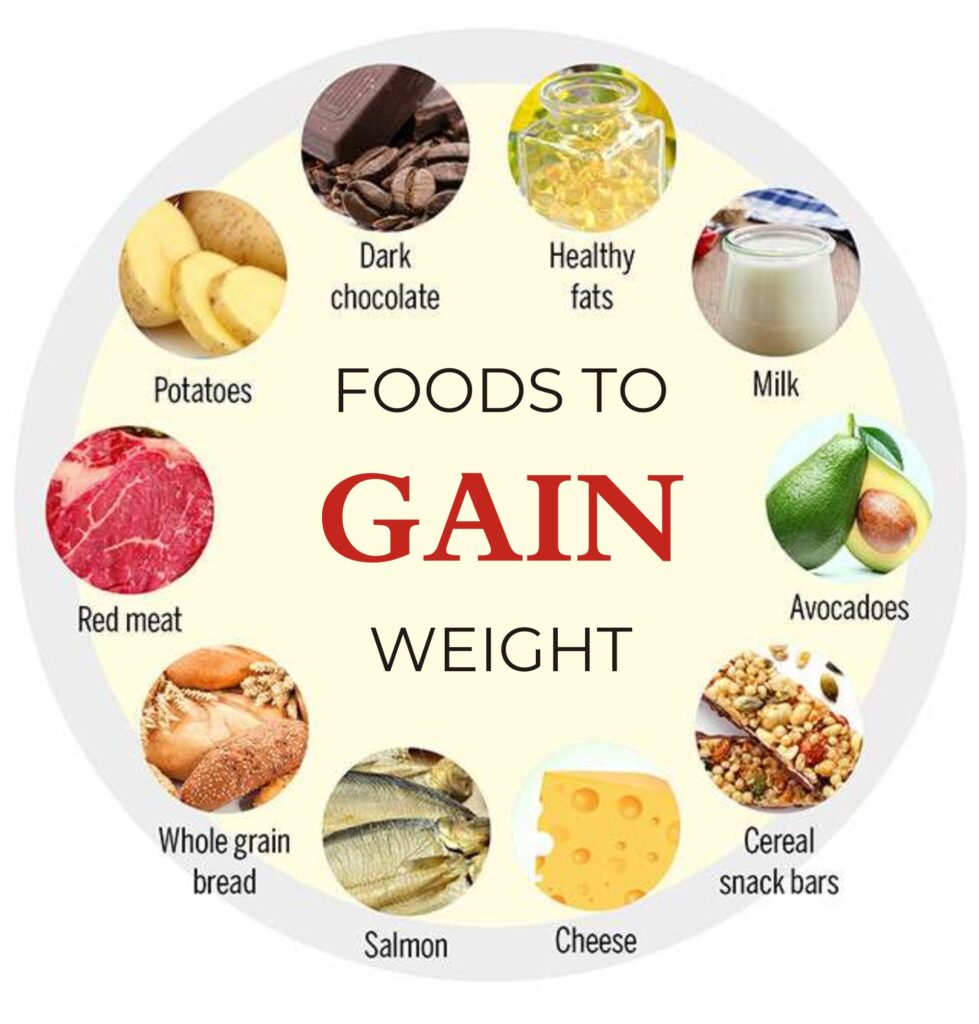
Potential Challenges and Solutions
Gaining weight can come with its own set of challenges. Here are some common challenges you might face on your weight gain journey and potential solutions to overcome them:
Loss of appetite
If you struggle with a loss of appetite, try incorporating smaller, frequent meals and snacks throughout the day. Opt for calorie-dense foods and include flavor enhancers like herbs, spices, or sauces to make your meals more appealing.
Digestive issues
Some individuals may experience digestive issues when increasing their calorie intake. To support digestion, incorporate foods high in fiber, drink plenty of water, and consider taking digestive enzymes or probiotics. It is also important to introduce new foods gradually to allow your body to adjust.
Food preferences and aversions
If you have specific food preferences or aversions, try experimenting with different recipes and cooking methods to make them more appealing to you. Incorporating a variety of flavors and textures can also help overcome food aversions.
Time constraints
Finding time for meal preparation can be challenging, especially if you have a busy schedule. Consider meal prepping on weekends or utilizing time-saving kitchen appliances like slow cookers or instant pots. Additionally, having healthy snacks readily available can help you meet your calorie goals when time is limited.
Workout and Exercise Considerations
While nutrition plays a crucial role in gaining weight, exercise and strength training can help promote muscle growth and overall health. Here are some considerations when it comes to workouts and exercise:
Strength training
Incorporating strength training exercises, such as weightlifting or resistance training, can help build muscle mass and promote weight gain. Focus on compound exercises that target multiple muscle groups and gradually increase the intensity of your workouts over time.
Cardiovascular exercises
Although cardiovascular exercises burn calories, they can still be beneficial for weight gain. Opt for low-impact exercises like brisk walking or cycling to maintain cardiovascular health without burning excessive calories.
Rest and recovery
Allowing your body time to rest and recover is vital for gaining weight. Ensure you get enough sleep, prioritize rest days, and listen to your body’s signals. Adequate rest and recovery will help prevent muscle fatigue, promote muscle growth, and support overall well-being.
In conclusion, gaining weight in a healthy manner requires a balanced diet that includes nutrient-dense foods, protein-rich options, carbohydrate sources, healthy fats, and calorie-dense snacks. Additionally, incorporating liquids, meal planning, and addressing potential challenges can contribute to successful weight gain. Remember to consider exercise and rest in your weight gain journey to promote muscle growth and overall well-being. With patience, consistency, and a positive mindset, you can achieve your weight gain goals and improve your overall health and confidence.
